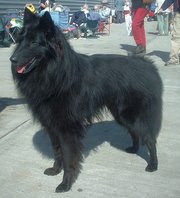Belgian Shepherd Dog
|
|
Belgian Shepherd Dog (also know as the Belgian Sheepdog or Chien de Berger Belge) can refer to any of four breeds of dog: the Groenendael, the Laekenois, the Tervueren, or the Malinois. In some regions, these are considered four different varieties of a single breed; in other regions, they are considered a single breed.
The American Kennel Club (AKC) recognizes only the Groenendael under the name "Belgian Shepherd", but also recognizes the Tervueren (with the alternative spelling "Tervuren") and the Malinois as individual breeds. The Laekenois can be registered as part of the AKC foundation stock service and should eventually be recognised fully by the AKC.
The Australian National Kennel Council, the Kennel Club (UK) and the New Zealand Kennel Club recognize all four as separate breeds. The Canadian Kennel Club follows the FCI classification scheme and recognises all four as varieties of the same breed.
All four breeds are hard-working, intelligent dogs of the same general size and temperament. They differ mostly in their coats and superficial appearance. The Malinois is often mistaken for a German Shepherd Dog.
They are so closely related that, when breeding any two dogs of the same "breed", it is possible for puppies of different "breeds" to be in the same litter. For example, a Groenendale litter could contain a brown-coated long-haired puppy; in countries that consider them the same breed, this is fine and the puppy would be a valid Tervueren, but AKC considers it to be an aberration of the all-black Belgian Shepherd and disqualifies it. Likewise, a Tervueren could have a short-coated puppy; in some countries, this is merely a Malinois coat variation but the AKC again considers it to be an invalid aberration.
| Contents |
Appearance
Temperament
Belgian Shepherds are bred to be highly intelligent, alert and sensitive to everything going on around them, and to develop extremely strong relationship bonds. This means that they need significant socializing as puppies, lifelong activity outlets, and will seek to be with "their human" all the time, preferably doing something rather than waiting around. They can find it very difficult to be left alone. During their juvenile years, they go through irrational fears (similar to the child who believes there is a monster in the closet), and can suddenly develop anxiety over some object or place which has never been a problem before, although these fade over time with a good positive lead. They tend strongly to be a "one person dog."
Belgian shepherds like to please, and can over-react badly to "negative" (punishment or deterrence based) training, so they should as a rule be clicker- or reward-trained only. They can also behave as if they think that they are smarter than their owners, so it is important for the owner to know how to train dogs or to enroll in training classes. Professional training is highly recommended by trainers/acadamies specific to this type of dog, as well as continued training or development beyond the basics, such as obedience or agility. This is because Belgian Shepherds as a rule require mental stimulation as much or more so then physical.
All the Belgian Shepherd breeds need a lot of activity and close interaction with people. Like most herding breeds, they need a job to do (be it frisbee in the park, herding, learning tricks, dog agility). Throwing a toy endlessly for the dog to fetch works for some breeds, but the Belgian breeds are intelligent and sociable dogs who can easily become bored with such simple and undemanding repetition.
An amusing series of humorous cartoons showing the lighter side of the Belgian Shepherd personality can be found here (http://www.bsdaofgb.co.uk/bsdfaq.htm).
Ownership
They are widely considered to be a fine looking dog, loyal, intelligent, fun, and well suited to family life. However because of their high sensitivity to criticism or to being ignored, their careful handling and socialising needs, their need for ongoing stimulation and purposeful activity, and their potential (in common with other high energy dogs such as Siberian Huskies) to develop problems or even become destructive if bored, they are not usually considered suitable for a first time or inexperienced owner, or one who cannot meet their needs.
Health
Belgians overall are fairly healthy as a breed, especially compared to many other breeds. Their main illnesses as a breed are epilepsy, hip dysplasia, and cataracts. A study at UC indicates that 17% (one in 6) will develop epilepsy, although most of these will only develop occasional petite mal and not be seriously affected by it. Their more compact form means they are less likely to develop dysplasia than German Shepherds or other breeds (around 8% or 1 in 12). Cataracts can develop around ages 2-4.
See also
- Belgian Shepherd Dog (Groenendael)
- Belgian Shepherd Dog (Laekenois)
- Belgian Shepherd Dog (Malinois)
- Belgian Shepherd Dog (Tervueren)
Dog Pictures and Clipart
- Pictures of Dogs (http://classroomclipart.com/cgi-bin/kids/imageFolio.cgi?direct=Animals/Dogs)
- Dog Clipart (http://classroomclipart.com/cgi-bin/kids/imageFolio.cgi?direct=Clipart/Animals/Dog_Clipart)
Clipart and Animal Pictures
- Clipart (https://classroomclipart.com/image/category/clipart.htm)
- Animal Clipart (https://classroomclipart.com/image/category/animal-clipart.htm)
- Animal Animated Clipart (https://classroomclipart.com/clipart/Animations/Animals.htm)
- Pictures of Animals (https://classroomclipart.com/image/category/animal-photos.htm)
- Amphibian Clip Art, Pictures and Photogaphs (https://classroomclipart.com/image/category/amphibian-clipart.htm)
- Farm Animal Clip Art, Pictures and Photographs (https://classroomclipart.com/image/category/farm-animal-clipart.htm)
- Mammal Clip Art, Pictures and Photographs (https://classroomclipart.com/image/category/mammal-clipart.htm)
- Marine Animal Clip Art, Pictures and Photographs (https://classroomclipart.com/image/category/marine-life-clipart.htm)
- Reptile Clip Art, Pictures and Photographs (https://classroomclipart.com/image/category/reptile-clipart.htm)
- Spider Clip Art, Pictures and Photographs (https://classroomclipart.com/image/category/spider-clipart.htm)



